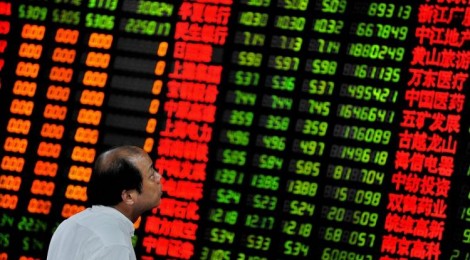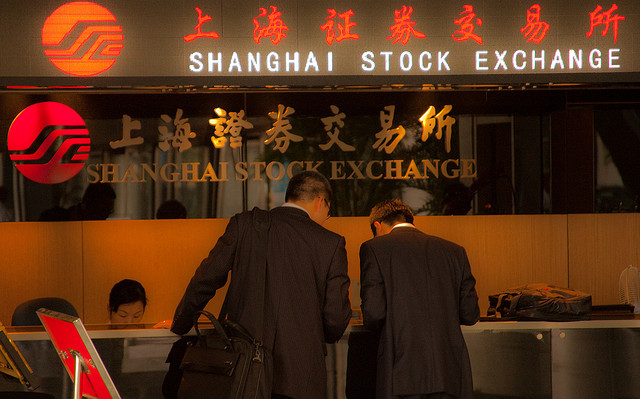
To panic or not to panic. Is this a bubble?
The Greek debt talks and the question of will they, won’t they leave the euro, have been standing out on the front pages of newspapers in the last few weeks, both in the West and in Asia. Despite how dangerous and dramatic the Greek crisis might seem, on the other side of the world another crisis could have much worst and wider global repercussions.
 In a “mood of panic”, this was the expression used to describe the condition of Asian stock market in the last few days; so worrying that front page headlines left behind even the tensions in the South China sea. In a press release, the China Securities Regulatory Commission (CSRC) stated that there is “a large increase in irrational dumping of shares, causing a strain of liquidity in the stock market”: the Chinese financial market is irrationally tumbling, and yesterday the decision was taken to suspend for six months stock market selling for those holding more than 5% of a company’s share. The measure aims at stabilizing the market after the recent terrible performance, with Shanghai and Hong Kong closing down 6 percent on Wednesday.
In a “mood of panic”, this was the expression used to describe the condition of Asian stock market in the last few days; so worrying that front page headlines left behind even the tensions in the South China sea. In a press release, the China Securities Regulatory Commission (CSRC) stated that there is “a large increase in irrational dumping of shares, causing a strain of liquidity in the stock market”: the Chinese financial market is irrationally tumbling, and yesterday the decision was taken to suspend for six months stock market selling for those holding more than 5% of a company’s share. The measure aims at stabilizing the market after the recent terrible performance, with Shanghai and Hong Kong closing down 6 percent on Wednesday.
The government is now doing everything it can to rescue the markets from what someone has already called “China’s 1929”, the year of the infamous US stock market crash and the beginning of the Great Depression. A de-facto suspension of new Initial Public Offerings has been announced and top brokerages have committed to buy nearly €18 billion of stocks to shore up the market. Moreover, the People’s Bank of China has cut interest rates to a record low and the CSRC has announced that it will relieve the liquidity crunch necessary to stabilize the market and avoid systemic risks. As an additional measure, the government banned 112 massive state-owned enterprises from selling their own and their subordinates’ stocks in this period of “unusual volatility” of the market. On Wednesday as many as 1476 firms listed in Shanghai and Shenzhen, meaning half of all listed firms on the two exchanges, have already announced trading suspensions.
But Beijing’s intervention does not seem to be working. Since reaching the peak on June 12, Shanghai stocks have plunged 30 percent in the space of three weeks, having soared more than 150 percent in the previous 12 months. Almost €3 trillion in share value – ten times Greek annual GDP – have evaporated.
The burst of the financial bubble is “a slap in the face of Chinese government” said Alberto Forchielli, presid ent of Osservatorio Asia. This explains because, unlike most stock markets where investors are for the large majority institutional, in China the 80 percent are small retail investors, particularly retirees. Playing the stock market allowed tens thousands Chinese to keep up with today’s living costs and many people borrowed money to invest in shares, magnifying the losses. What is taking place is then a natural readjustment of the prices, correcting that 150 percent growth which was speculative and not reflecting the real fundamentals of economy. China’s market started growing when its economy began slowing down because the buyers outnumbered the sellers. When the Chinese government, worried about the slowing of economy, decided last November to lower interest rates for the first time, an additional capital flow fueled the bubble.
ent of Osservatorio Asia. This explains because, unlike most stock markets where investors are for the large majority institutional, in China the 80 percent are small retail investors, particularly retirees. Playing the stock market allowed tens thousands Chinese to keep up with today’s living costs and many people borrowed money to invest in shares, magnifying the losses. What is taking place is then a natural readjustment of the prices, correcting that 150 percent growth which was speculative and not reflecting the real fundamentals of economy. China’s market started growing when its economy began slowing down because the buyers outnumbered the sellers. When the Chinese government, worried about the slowing of economy, decided last November to lower interest rates for the first time, an additional capital flow fueled the bubble.
The stability measures introduced by the government have done little to calm investors in the last weeks. “I don’t see it getting better,” said this week Christopher Balding, professor of economics at Peking University. “There is not going to be a turnaround within the next week or two. It probably has a long way to go.” And with large numbers of private investors losing a lot of money, political concerns have been raising in Beijing. At least till yesterday, when Chinese stocks entered a positive phase as Beijing launched new measures to halt a dramatic sell-off prompting Asian markets to rebound. But will the gains last?




